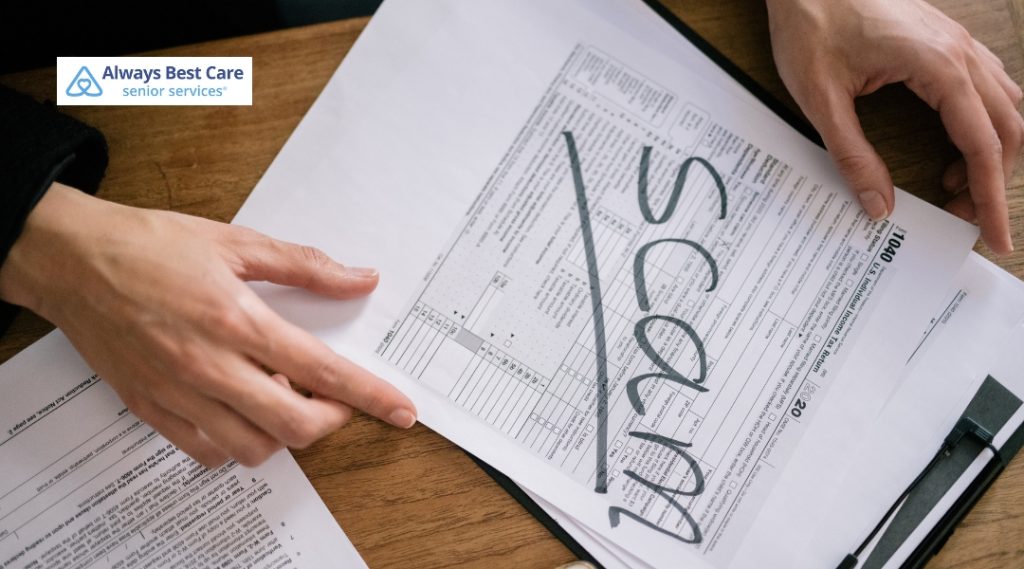Stay Safe: How Seniors Can Spot and Avoid Scams in Greater Boston, MA

As we age, we gain a lifetime of experience, wisdom, and resilience. But even with all that knowledge, scammers are getting trickier—and unfortunately, seniors are often at the top of their target list.
Why?
Because many seniors are kind, trusting, and eager to help. Some may not be as familiar with new technology, while others simply want to be polite. Scammers know this—and they’re not afraid to take advantage.
If you’re a senior living in Greater Boston—or you have a loved one who is—it’s essential to stay informed. Scams come in many forms, from fake IRS calls to bogus investment pitches.
But with some knowledge and the right tools, you can protect yourself and those around you!
Table of Contents
6 Common Scams Seniors Face in Greater Boston
- Phone Scams: Scammers often pretend to be government officials, police officers, or even distressed grandchildren. They call with urgent stories designed to scare or confuse seniors, hoping to trick them into handing over money or sensitive personal details.
- Medicare & Health Insurance Scams: Fraudsters pose as Medicare reps or insurance agents, claiming to offer new benefits or services. Their goal? To steal your personal information or bill you for services you never received.
- Tech Support Scams: A pop-up appears on your screen, or someone calls, claiming your computer has a virus. They’ll ask for remote access or demand payment for fake “repairs.” It’s all a trick to get your money or install malware.
- Sweepstakes & Lottery Scams: “You’ve won a prize!” sounds exciting—but if you’re asked to pay fees or taxes upfront to claim it, it’s a scam. Real sweepstakes never require payment to receive winnings.
- Romance Scams: Online scammers build fake relationships through dating sites or social media. Once trust is built, they invent emergencies and ask for money, often disappearing after receiving it.
- Charity Scams: Especially after natural disasters or around the holidays, fake charities pop up to take advantage of your generosity. These scams use emotional appeals to steal donations—and your personal information.

4 Signs Something Isn’t Right
Even the savviest people can get caught off guard by a scam. Here are some common red flags to watch out for:
- Urgent Demands for Payment: Scammers often create a sense of panic—saying you owe money or a loved one is in trouble—and demand you act immediately. They don’t want you to stop and think or verify the facts.
- Unusual Payment Methods: If someone asks you to pay using gift cards, cryptocurrency, or wire transfers, it’s a big red flag. Legitimate organizations never ask for payment in these forms.
- Suspicious Messages: Watch out for emails or texts with poor grammar, strange formatting, or vague language. Messages that include odd links or ask for personal info should always be treated cautiously.
- Fake Claims of Authority: Scammers pretend to call from the IRS, Medicare, or even the police. They use official-sounding language to sound legitimate, but real agencies won’t call out of the blue demanding money or private information.
Simple Ways to Stay Safe and Protect Yourself Against Scams
A little caution goes a long way toward staying safe from scams.
Always verify requests before acting—whether it’s a call, email, or message. If someone claims to be from a bank, government agency, or business, contact that organization directly using a trusted phone number or website.
Protect your personal information by keeping details like your Social Security number, bank account info, and passwords private. Never share them with unfamiliar callers or online contacts, no matter how official they sound.
Stay alert, and don’t be afraid to ask questions. If an offer sounds too good to be true or you feel pressured to act quickly, it’s probably a scam. Reviewing your bank and credit card statements can also help you catch any unusual activity early.
One of the best defenses is open communication. Rely on trusted family members for support or talk to caregivers about potential scams. Staying informed and sharing knowledge are two of the best ways to protect yourself and others.

How In-Home Care in Boston Can Provide Added Protection
At Always Best Care, we understand the risks scams can pose to seniors—and we’re here to help. Our professional in-home caregivers are important in safeguarding older adults from fraud.
They can help screen phone calls, sort through mail, and spot anything that seems suspicious.
Caregivers offer practical support and companionship. Reducing isolation is a powerful way to prevent scams, as loneliness can make someone more likely to engage with a fraudster.
Always Best Care provides peace of mind for seniors and their families with compassionate care and an extra set of eyes and ears.
At Always Best Care of Greater Boston, we are dedicated to ensuring the safety and well-being of seniors. Our compassionate caregivers provide daily assistance, companionship, and guidance to help protect against fraud.
Contact Always Best Care of Greater Boston at (617) 489-9000 to learn more and schedule your free consultation. Stay informed, stay alert, and stay safe.





